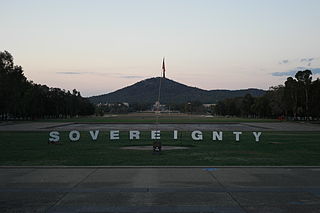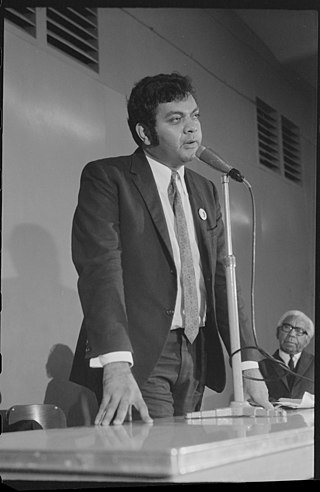
Australian Indigenous sovereignty, also recently termed Blak sovereignty, refers to various rights claimed by Aboriginal and Torres Strait Islander peoples over parts or all of Australia. Such rights are said to derive from Indigenous peoples' occupation and ownership of Australia prior to colonisation and through their continuing spiritual connection to land. Indigenous sovereignty is not recognised in the Australian Constitution or under Australian law.

The Aboriginal Tent Embassy is a permanent protest occupation site as a focus for representing the political rights of Aboriginal Australians and Torres Strait Islander people. Established on 26 January 1972, and celebrating its 50th anniversary in 2022, it is the longest continuous protest for Indigenous land rights in the world.
Native title refers to rights, recognised by Australian law, held by Aboriginal and Torres Strait Islander groups or individuals to land that derive from their maintenance of their traditional laws and customs. These Aboriginal title rights were first recognised as a part of Australian common law with the decision of Mabo v Queensland in 1992. The doctrine was subsequently implemented and modified via statute with the Native Title Act 1993.

The Block is a colloquial but universally applied name given to a residential block of social housing in the suburb of Redfern, Sydney, bound by Eveleigh, Caroline, Louis and Vine Streets. Beginning in 1973, houses on this block were purchased over a period of 30 years by the Aboriginal Housing Company (AHC) for use as a project in Aboriginal-managed housing.

John Newfong was an Aboriginal Australian journalist and writer. A descendant of the Ngugi people of Moreton Bay, he was the first Aboriginal person to be employed as a journalist in the mainstream print media in Australia.
Australian administrative law defines the extent of the powers and responsibilities held by administrative agencies of Australian governments. It is basically a common law system, with an increasing statutory overlay that has shifted its focus toward codified judicial review and to tribunals with extensive jurisdiction.

Michael James Dodson is an Aboriginal Australian barrister, academic, and member of the Yawuru people in the Broome area of the southern Kimberley region of Western Australia.

Coleen Shirley Perry Smith AM MBE, better known as Mum Shirl, was a prominent Wiradjuri woman, social worker and humanitarian activist committed to justice and welfare of Aboriginal Australians. She was a founding member of the Aboriginal Legal Service, the Aboriginal Medical Service, the Aboriginal Tent Embassy, the Aboriginal Children's Services, and the Aboriginal Housing Company in Redfern, a suburb of Sydney. During her lifetime she was recognised as an Australian National Living Treasure.
The National Black Theatre (NBT) was a theatre company run by a small group of Aboriginal people based in the Sydney suburb of Redfern which operated from 1972 to 1977. The original concept for the theatre grew out of political struggles, especially the land rights demonstrations, which at the time were being organised by the Black Moratorium Committee. The centre held workshops in modern dancing, tribal dancing, writing for theatre, karate and photography, and provided a venue for new Aboriginal drama. It also ran drama classes under Brian Syron, whose students included Jack Davis, Freddie Reynolds, Maureen Watson, Lillian Crombie, and Hyllus Maris.
Matilda Williams House was born in 1945 on the Erambie Aboriginal Reserve at Cowra, New South Wales (NSW), and raised in her grandfather’s house at Hollywood Aboriginal Reserve in Yass, NSW. When she was 12, House spent a year in Parramatta Girls' Home. House was one of ten children.
Indigenous land rights in Australia, also known as Aboriginal land rights in Australia, are the rights and interests in land of Aboriginal and Torres Strait Islander people in Australia; the term may also include the struggle for those rights. Connection to the land and waters is vital in Australian Aboriginal culture and to that of Torres Strait Islander people, and there has been a long battle to gain legal and moral recognition of ownership of the lands and waters occupied by the many peoples prior to colonisation of Australia starting in 1788, and the annexation of the Torres Strait Islands by the colony of Queensland in the 1870s.

The Boomalli Aboriginal Artists Co-operative was founded in 1987 in the Sydney suburb of Redfern, New South Wales. Among the legacies of the Co-operative are the Deadly Awards for achievement in the Indigenous Australian community, which occurred annually from 1995 to 2013. The 20th anniversary of the Co-operative was celebrated in 2007 with an exhibition at the Art Gallery of NSW.
The Cake Man is a 1975 play by Aboriginal Australian writer Bob Merritt, notable for being the first play written by an Indigenous Australian person to be published, televised and to tour out of Australia. A telemovie was made of a 1977 performance of the play. The Aboriginal Theatre Company was formed by Bob Merritt and Brian Syron especially to produce the play for a tour to the United States in 1982.
The Aboriginal Legal Service (NSW/ACT) (ALS), known also as Aboriginal Legal Service, is a community-run organisation in New South Wales and the Australian Capital Territory, founded in 1970 to provide legal services to Aboriginal Australians and Torres Strait Islanders and based in the inner-Sydney suburb of Redfern. It now has branches across NSW and ACT, with its head office in Castlereagh Street, Sydney and a branch office in Regent Street, Redfern.

Jenny Munro is an Australian Wiradjuri elder and a prominent activist for the rights of Indigenous Australians. She has been at the forefront of the fight for Aboriginal housing at The Block in Sydney and started the Redfern Aboriginal Tent Embassy. She is the sister of activists Isabel Coe and Paul Coe.
Isabel Edie Coe (1951–2012) was a Wiradjuri woman born at Erambie Mission near Cowra, and one of the most prominent Australian Aboriginal leaders.
Erambie Mission is an Aboriginal community located on the western banks of the Lachlan River, 2.5 km (1.6 mi) from the town of Cowra, in the Central West region of New South Wales, Australia.
Jane Hamilton Mathews was a judge of the Supreme Court of New South Wales, a judge of the Federal Court of Australia and President of the Administrative Appeals Tribunal.

The Redfern Aboriginal Children's Services, also known as Redfern Aboriginal Children's Services and Archives, or simply Aboriginal Children's Services (ACS), is a community services organisation for Indigenous Australian children in Sydney, Australia.
Lyall Thomas Munro Jnr is an Aboriginal Australian elder, a former activist and member of many organisations serving Aboriginal Australians. He is known as a local leader in the town of Moree, New South Wales. he is the son of Lyall Munro Snr, and the husband of Jenny Munro.









